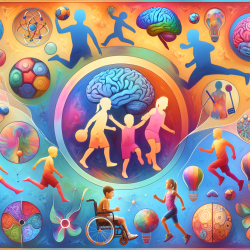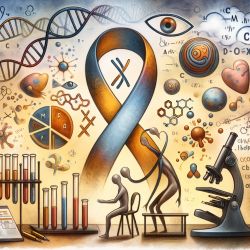In the realm of speech-language pathology, data-driven decisions and evidence-based practices are crucial for fostering optimal outcomes for children. A recent scoping review titled "Impacts of Participation in Community-Based Physical Activity Programs on Cognitive Functions of Children and Youth with Neurodevelopmental Disabilities" sheds light on the significant cognitive benefits of physical activity for children with neurodevelopmental disabilities (NDD). This blog will delve into the key findings of this research and provide actionable insights for practitioners.
Key Findings from the Scoping Review
The scoping review analyzed 60 studies, revealing numerous positive cognitive outcomes associated with physical activity in children with NDD. The cognitive benefits include:
- Improved attention and focus
- Enhanced self-control
- Better cognitive processing
- Increased alertness
Notably, no studies reported negative associations between physical activity and cognitive outcomes, underscoring the potential of physical activity as a beneficial intervention for children with NDD.
Practical Applications for Practitioners
Based on the findings of this review, practitioners can consider the following strategies to integrate physical activity into their therapeutic practices:
- Incorporate High-Intensity Activities: Activities such as aerobic exercises, which have been shown to improve attention and self-control, can be integrated into therapy sessions.
- Utilize Equine-Assisted Therapy: This form of therapy has demonstrated significant improvements in attention and cognitive control, particularly in children with Autism Spectrum Disorder (ASD).
- Leverage Group Sports: Engaging children in team sports can enhance social integration and cognitive functions such as working memory and executive control.
- Tailor Activities to Individual Needs: Customize physical activities based on the specific NDD and cognitive goals of each child to maximize therapeutic benefits.
Encouraging Further Research
While the scoping review provides a comprehensive overview of the positive impacts of physical activity on cognitive functions in children with NDD, it also highlights the need for further research. Practitioners are encouraged to contribute to this growing body of evidence by conducting studies that explore:
- The long-term effects of physical activity on cognitive development
- The impact of different types of physical activities on various cognitive functions
- The role of physical activity in enhancing academic performance and social skills
By engaging in and supporting further research, practitioners can help refine and optimize therapeutic interventions for children with NDD.
Conclusion
The evidence from the scoping review underscores the favorable impact of physical activity on the cognitive outcomes of children and youth with NDD. Practitioners are encouraged to integrate physical activity into their therapeutic practices and contribute to further research to enhance the quality of life and cognitive development of children with NDD.
To read the original research paper, please follow this link: Impacts of Participation in Community-Based Physical Activity Programs on Cognitive Functions of Children and Youth with Neurodevelopmental Disabilities: A Scoping Review.










